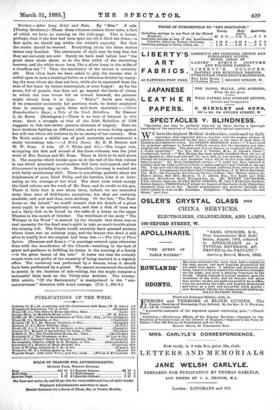NovELs.—After Long Grief and Pain. By "Rita." 3 vols. '(Tinsley
Brothers.)—These three volumes contain three tales, a fact of which we have no warning on the title-page. This is better, perhaps, than if the first had been spun out till it filled the three,—a feat quite, we should say, within the writer's capacity. Bat then the reader should be warned. Everything about the three stories seems very familiar. The ornaments of style may be very fine, but they are certainly not new. Surely we have read before bow "the great stars shone above us in the blue width of the stretching heavens, and the white moon hung like a silver lamp in the midst of a cloudless sky " ? Then the machinery of the stories is certainly old. How often have we been asked to pity the heroine who is called upon to save a bankrupt father or a felonious brother by marry- ing the man whom she does not love, while she is separated from the man of her heart by letters intercepted, or even forged ! As for the scene, full of passion that does not go beyond the limits of virtue, in which the true lovers bid an eternal farewell, the printers might almost keep it in type. " Rita's " facile pen might, if we remember accurately her previous work, be better employed than in making up again these well-worn materials.—Great Grandmother's Days; a Tale of the Irish Rebellion. By Eleanor IL de Butts. (Remington.)—There is no lack of interest in this story. Such a struggle as that of the Irish Rebellion of 1798 suggests to this tale-writer genuine elements of tragedy. Here we have brothers fighting on different sides, and a woman loving against her will one whom she believes to be an enemy of her country. Miss De Butts makes a skilful use of good materials, and constructs a really interesting tale.-21. Noble Name. By B. H. Buxton and W. W. Fenn. 3 vols. (F. V. White and Co.)—The longer tale, occupying the first and second of the three volumes, was the joint work of Mrs. Buxton and Mr. Fenn. There is little to be said about it. The surprise which breaks upon us at the end of the first volume is one which practised novel-readers will have anticipated, and the denouement is according to rule. Meanwhile, the story is worked out with fairly satisfactory skill. There is something pathetic about the helplessness of poor, blind Philip, and the heroine, Linn is as inter- esting as the average of her kind. The short tales which occupy the third volume are the work of Mr. Fenn, and do credit to his pen. There is little that is new about them, indeed, we are reminded more than once of well-known narratives ; but they are certainly readable, and, now and then, even striking. Of the last, "The Boat- house on the Island," we would remark that the details of a ghost story ought to be scrupulously exact, and that a dish of trout was not a likely dish to be found on the table of a house on the upper Thames in the month of October. The weirdness of the story "The Whisper in the Wood" is marred by the thought that there was no real necessity for the dead man's spirit to take so much trouble about the missing will. The Courts would certainly have granted probate where there was an existing copy, and the lawyer who drew it still alive to testify how the original had been lost.—The City of Three Spires. (Bemrose and Sons.)—" A marriage entered upon otherwise than with the benediction of the Church—resulting in the lack of grace and guidance in fulfilling its duties in the training of a family —is the great lesson of the tale." It turns out that the unlucky couple were not guilty of the enormity of being married in a registry office. The ceremony was performed by a deacon, when it should tave been performed by a priest. We cannot recommend the author to persist in the business of tale-writing, but she might compose a successful little book on the Thirty-nine Articles. The twenty- fifth article, "Of the Sacraments," is manipulated in the "non- -natural-sense" direction with much courage. (Vol. I., 281-2.)


































 Previous page
Previous page